- Home
- J. -H. Rosny aîné
The Givreuse Enigma Page 4
The Givreuse Enigma Read online
Page 4
These words drove Augustin de Rougeterre to despair. He tried in vain to escape the certainty that they were emitting and forcing into the very depths of his soul. He did not want to be convinced—or, at least, he had a vague desire not to be convinced so quickly. But time seemed to have been abolished; a prodigious abundance of impressions overwhelmed the old gentleman and found a powerful echo in his mysticism. “Very well,” he said, finally, with a sort of fatalism, “I’ll put you to the test. Would one of you care to follow me?”
One of them got up. Augustin led him along the hallway to his study. There he opened a drawer, took out a little album, and opened it at the second page. He pointed to an ink drawing that represented a young woman. “Who is that?” he asked.
“It’s my great-aunt, Pauline de Rougeterre.”
“And who made the drawing?”
“You did, uncle.”
The drawing was not signed. Augustin’s face showed a trace of tender emotion. He leaned over to the young man and embraced him. The other returned the kiss with evident affection, but with a strange stiffness.
“Let’s see,” said the old man. He displayed a dozen daguerreotypes and more recent photographs; Pierre de Givreuse recognized all of them. Finally, with a slight tremor, Augustin opened a minuscule enameled box in which a ring set with emeralds was sparkling.
“It’s a family heirloom,” said the soldier, gravely. “It belonged to my great grandmother, the Marquise Catherine de Givreuse, who died on the scaffold in January 1794.”
“There’s no doubt about it!” affirmed the old man. “You’re my nephew Pierre.”
“Wait!” replied the young man, wearily. “You haven’t heard my…companion.”
Rougeterre shook his head. At that moment, his mind was made up; if the matter still seemed extraordinary, it seemed less supernatural—but he said: “We’ll see. Would you care to wait for me in the hall?”
He went out with Givreuse and went to look for the second soldier. Then he showed him the drawing of the young woman. Like the other, he recognized Pauline de Rougeterre and attributed the drawing to his uncle…
The Comte’s soul filled with darkness then, and, as the soldier recognized all the portraits assembled in the album, the sensation of a prodigy returned with increased force. “My God, have I lost my mind? Only madness can explain it all. Am I mad?”
He studied himself in a mirror; then he felt himself as one does in a dream. “No, if I were mad, I wouldn’t have these doubts. I wouldn’t be able to look back at myself. In that case, though, the universe is frightfully different from what I imagined…” From the depths of the unconscious, these words rose to his lips: “One God in three persons…why not one man in two persons…and perhaps…why not all men in two persons? Man is made in God’s image…and if God is the sum of all knowledge…He is also the sum of all mysteries…He reveals the knowledge and the mysteries to us according to desires and circumstance that He alone directs…may Thy Will be done, on Earth as it is in Heaven!”
He turned to the soldier and hugged him to his bosom. “You too are Pierre de Givreuse!” he stammered. Then, noticing that the young man was pale and tired, he said: “What’s the matter, my boy?”
“It’s nothing—the fatigue of being without him.”
“Then let’s go rejoin him!” They went. “What shall we do now?” asked Rougeterre when they were all together again in the hall. “Surely you haven’t seen your mother…”
“How could we dare? We needed your advice. If we were to appear before her together, unexpectedly, she’d be terribly distressed. And if we were to appear separately, she’d be alarmed by our evident weakness. It’s desirable that we aren’t separated and that our duality seems merely extraordinary. This is what we thought. One of us will not be Pierre de Givreuse. A resemblance, even an unprecedented one, will doubtless provoke extreme surprise, but not fear or anguish, especially if she has been told about it in advance. Our mother will understand that a fervent friendship has arisen between us, similar to the affection of twins.”
Augustin reflected for some time. He had difficulty setting his thoughts in order. The evidence of superhuman intervention now seemed overwhelming. Sometimes he saw a sinister Will at work, sometimes the most marvelous favor of the Beyond. Haggardly, he replied: “I’ll do as you wish. Besides, your idea seems reasonable to me. We need to iron out certain details, but…” Pallor was succeeded by redness in his temples. His voice lowered to a whisper. “Don’t you have any memory of something strange…a memory that might resemble a dream?”
“Nothing. Between the moment when I fell on the battlefield and the moment when we woke up, our memory is void.”
“Completely?”
“Completely.”
“God does not want it known!” said the Comte, putting his hands together. “May His will be done…”
VI.
When Madame de Givreuse had heard the story that Augustin told her, she was bewildered. Then she asked: “And the resemblance really seems absolute to you?”
“Perhaps there are a few trivial—very trivial—differences. I was too emotional to discern them…but it seems to be impossible to maintain that one is more like Pierre than the other!”
“I doubt that I could be mistaken!” said Madame de Givreuse, pensively. “Mothers have a sixth sense, Augustin.” She was smiling now. An entire and immeasurable universe seemed to be displayed within her, fading into eternity. Passionately, she exclaimed: “Why isn’t he here? Why has he made me wait?”
“Because of his very affection. He feared…”
She interrupted him hotly: “Has he something to hide? His wounds?”
“They’re not at all serious—but he’s still thin and pale. He would doubtless have notified you of his return, but he feared the uncertainty of the post and the telegraph.”
She had already calmed down. Her clear face was redolent with an ardent softness that age had been unable to dull, scarcely streaked by a few wrinkles as fine as virginal thread. She had the same eyes as Pierre de Givreuse and copious hair worn in the Montespan style, whose silky gold was mingled with silver skeins.
“Oh, may he come soon,” she whispered.
She was standing up when they came in; she rushed to meet them, but her dash was interrupted, so profound was her surprise—and she stopped, enchanted and consternated at the same time, trying to distinguish between her son and the stranger. Slight differences were manifest to her sharp gaze. The face of one seemed slightly larger than the other’s, and the texture of their skin did not seem to be identical, but she could not tell which of them resembled Pierre more.
“My son!” she cried, in the vague hope that the appeal would give birth to some revelatory emotion.
The two faces expressed the same anxiety. Finally, one muted and hesitant voice replied: “Mother!”
She was already hugging the one who had spoken—but she glimpsed a tremulous tenderness in the other’s gaze, which upset her. “Welcome,” she said, extending her hand to him. “I’ve been told that your friendship is perfect.” She sighed, and added, involuntarily: “And I can understand that!”
Again she embraced the one who had replied to her cry—then, moved by an irresistible impulse, she put her hands on the other’s shoulders. She withdrew them immediately. A host of contradictory feelings tormented her, in which constraint was mingled with joy and obscure anxieties corroded hope.
Light footsteps were heard, and a sparkling daughter of men appeared in the doorway. She advanced with the rhythmic step of a Cycladean fisherwoman, but she was tall. She had a Nordic face, fine and fluid cheeks, eyes as variable as the waves; her plaited hair was black with a copper sheen. On seeing the two men she released an exclamation that was almost a plaint. Then she stopped, her pupils dilating while they looked at her, both very pale.
“Will you be any more clairvoyant than me, Valentine?” murmured Madame de Givreuse. “I was unable to recognize Pierre.”
The yo
ung woman looked at them, concentrating her attention and appealing to the memory of forms and colors that is so sharp at her age.
Finally discouraged, she said: “I don’t know.”
Part Two
I.
The days went by. Little by little, invincible habitude rendered normality to one of the strangest adventures ever related in the annals of humankind. Madame de Givreuse became accustomed to the double presence of the person she believed to be her son and the fantastic unknown, who had adopted the name of Philippe Frémeuse.
For two weeks, the young men did not go out at all, save for a few furtive walks in the evening, in the most deserted streets. They hardly ever separated. Not only did their strength and their faculties diminish when they were not together, but they were gripped by a sort of dread, the sensation of a frightful solitude.
A very slow metamorphosis took place, however, in their physical and mental being. Their skin became less transparent, their complexion less dull, and their hair seemed thicker. Their density also increased; from the 37 kilograms that they weighed at the beginning of their sojourn in Gavres, they advanced to 44.
It was with Valentine de Varsennes that their relations were most singular. The young woman had been living with Madame de Givreuse for three years when the war broke out. At first, Valentine had seemed to be a child. A firm and fugitive passion for travel had absorbed Givreuse. It was in the two months before the war that he had begun to love the young guest, with a passion that remained secret, because Pierre thought that no transient adventure was admissible. The Medieval right of sanctuary, the privilege of hospitality, conferred sacred rights upon Mademoiselle de Varsennes. Nothing other than a love “for better or worse” seemed acceptable. He waited for time to reveal the true significance of circumstances.
When war broke out, he was no longer uncertain of himself, but he could not discern Valentine’s sentiments clearly. She was unaware of them; she was a simple soul. Her inexperience was more complicated than many experiences. In the enchantment of blossoming, suffering is often as powerful as joy, a certain horror is mingled with gratitude, and subtle dread renders every ambition fearful. One is a poor creature subject to powers that often seem brutal, and desire is balanced by menacing mystery. Nevertheless, she experienced a powerful attraction to Pierre; his was the only male face she admitted into her dreams. When they separated, too many evil possibilities veiled the future. At the ominous moment of farewell, there was a great spark between them, but nothing was said.
The two soldiers retained an indestructible memory of that moment. When they saw Valentine again, they experienced a shudder of resurrection, and each of them knew that his impressions were identical to the other’s. They did not feel any jealousy. When they reflected, they were abstractedly constrained to consider one another as rivals. Without influence over their sensations, inasmuch as their sensations related to themselves, that conviction had an effect on their relationship with Valentine. They moved silently and furtively; they could not see any outcome of their love; they considered that it would be odious not to conceal it.
This situation disorientated the young woman. She often experienced an obscure distress, sometimes a sort of shame that ramified into the most delicate regions of her soul, sometimes an astonishment mingled with consternation or an ardent and sad curiosity. The palpitant moment of farewell and the great spark that sprang from the unconscious were Valentine’s most striking memories; they created the fine substance of those dreams that grow like living organisms, whose roots are steeped in the mysteries of life.
During Pierre’s absence, love had come, as furtive as little flowers in the depths of a wood. All the anxiety and all the pain of the war were mingled with it, but also the untiring strength that builds and rebuilds. Its complexity and its detours were nuances of the soul, not ambiguities or equivocations. Since his return, terrifying elements mingled with elements so troubling that the reality of the world was turned upside-down—and yet, love persisted. It persisted fantastically. It was one man that Valentine loved—the one who had formerly lived at the Château de Givreuse and whose identity was certain—but how could he be distinguished from the other? When she found herself alone with the one playing the role of Pierre, he no longer seemed to be himself; he was only partly present—and that corresponded to a reality. Alone, each of them was clad in an imperfect appearance, ambiguous and bearing less resemblance to Givreuse.
She tried in vain to rationalize it, but all logic became false, insufficient and wretched.
To hasten the recovery of the wounded men, Madame de Givreuse resolved to go back to the country. They returned to the Château de Givreuse, of which only the west wing was habitable. It was the domain of bats; they shared the granite with rooks, seabirds and swifts. A population of gorse and broom had made inroads into the ruins, the Atlantic winds roared over the stunted oaks, and the hedgehogs came out in the starlight like bristling phantoms. The west wing was comfortable, though; the stone was dry, the bay windows opened large eyes to the Sun as it rose over the fields and set into the sea. Crackling fireplaces consumed gorse, pines and oaks. The walls were made of the same granite as the cliffs, coarse, indestructible and reassuring.
In this primitive refuge, the soldiers and Mademoiselle de Varsennes lived an affectionate existence. They were scarcely aware of its strangeness. The entire ambience—the eternal palpitation of the heart of the waters; the rumble of the tides; the storms charged with the odor of distant lands; the immense nights; the ancient stones of the château, which retained the memory of tumultuous generations of yesteryear; and, on the distant deserted plain, the dolmens and cromlechs impregnated with the primitive soul—was amenable to mysterious things.
Love followed its course, like gravitation, like the rays of light that travel through the interstellar darkness, like the avid seeds of gorse and brambles; because it contains the totality of Enigma, it adapts to all enigmas. It increased in Pierre and Philippe, all the more strongly because they were weaker. It increased in Valentine, dolorous and fearful, as chaste as the silver river that seems to run from the Moon in never-ending waves on clear nights.
Meanwhile, the young men’s metamorphosis was incessant. Intensive alimentation restored their lost energy and rapidly augmented their density—for the troubling anomaly remarked at Gavres persisted. By mid-December, they each weighed about 55 kilograms, without their plumpness changing noticeably. In truth, their faces appeared almost normal; the cheeks were no longer as hollow, but the rest of the body remained slim and lithe.
There was also a psychic, or rather a physiological, metamorphosis. Although they still experienced the same affection for one another, their nerves tolerated separation better. It now required quite a long time for them to experience the full intensity of the impression of weakness, anguish and solitude that the absence of the other caused each of them. To be sure, as soon as a certain distance separated them, Philippe and Pierre soon felt ill, but that ill-feeling was tolerable for more than an hour. It was only then that it began to turn into suffering and communicated a sensation of great fatigue. They did not submit willingly to such proof, but they admitted its usefulness—and someone obliged them to submit, for a wise and energetic individual gave them his attention and imposed his will upon them.
This was the aged neurologist Bernard Savarre, whose sanatorium was located beyond the great cliff, in the middle of a heath. Only strange creatures were cared for there. Four buildings, separated by gardens, sheltered the inmates, classified according to their defects. Although he had lived for 25 years with neurasthenics and the demented, Savarre maintained his own mental health. While the singular influence of nervous disorders—whose contagion is closely analogous to that of microbial diseases—continually struck down doctors, and nurses of either sex, Savarre remained invulnerable, astonished by his own immunity. His was a mind as open as human infirmity permits. He had not replaced his religious beliefs with any of the superstitions of men of scienc
e. Nothing seemed incredible to him. According to him, there was no such thing as absurdity, and any contradiction could only be apparent.
“What is reason but a crystallization of ancient experience?” he said. “Since the dawn of history, we have seen several, of our best fleets sunk. How incoherent Plato now seems, and how derisory Aristotle is! And yet, they were incomparable intellects. Be sure that marvelous usage will be made of new constructions, which will yet surpass the maneuvers of Spencer and young Nietzsche.”
The case of the Givreuses had astounded him, though. He searched for an equivalent in ancient texts and could not find one. “There are certainly stories as extravagant,” he said, “but they’re imaginary. The question is whether this one is real. If it is, we’ve entered into an unprecedented era—and all terrestrial life too.”
He doggedly re-checked the proofs. They were as good as those of the surest scientific discoveries. The anomaly of their density struck him most of all. At the time when he received the first confidences, the respective weight of the young men was no more than 45 kilograms. This weight was in flagrant disproportion to the volume of flesh and bone. According to appearances, Philippe and Pierre should each have weighed about 70 kilograms—and it was known, with utter certainty, that before his departure, Pierre had weighed 73.
Savarre also enquired, insistently, about the place where Pierre had fallen; he noted that it was not the same as the place where they had been picked up.
“The place where this phenomenon occurred must be of some importance, whether the event was biological, psychic or social,” he remarked one evening, when he was chatting to the Givreuse’s doctor—a man so reliable that nothing was hidden from him.
“What do you mean by a social event, in this instance?”

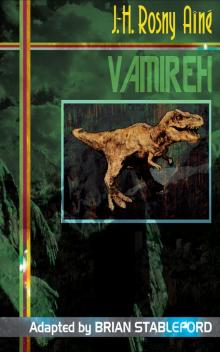 Vamireh
Vamireh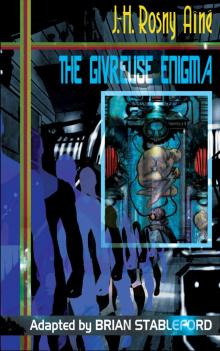 The Givreuse Enigma
The Givreuse Enigma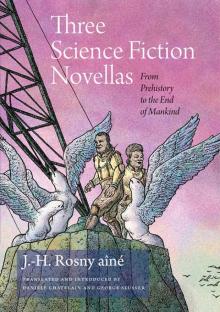 Three Science Fiction Novellas: From Prehistory to the End of Mankind
Three Science Fiction Novellas: From Prehistory to the End of Mankind Helgvor of the Blue River
Helgvor of the Blue River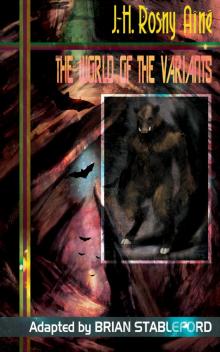 The World of the Variants
The World of the Variants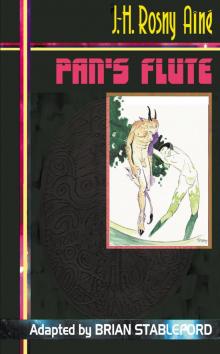 Pan's Flute
Pan's Flute The Navigators of Space
The Navigators of Space The Mysterious Force
The Mysterious Force